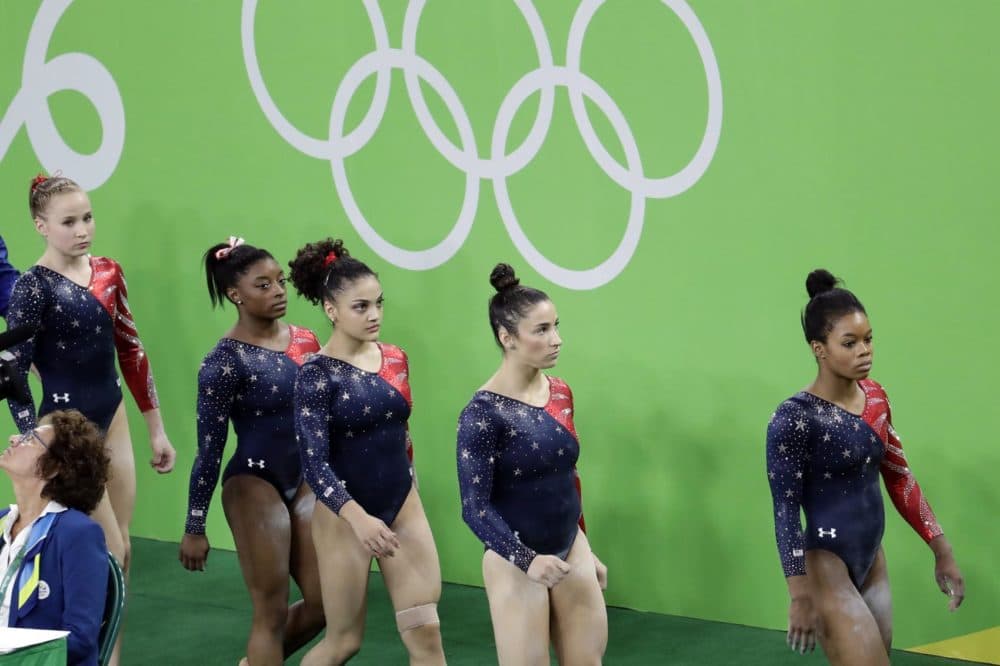Advertisement
Will New Olympic Abuse Prevention Policy Make Athletes Safer?

Editor's Note: This segment discusses rape and sexual violence, and contains audio that some listeners may find disturbing or offensive.
With Meghna Chakrabarti
New guidelines to protect young athletes from abusive coaches will soon go into place. Critics say the plan is flawed.
Guests
Sarah Klein, sexual abuse victims attorney and advocate; earliest known victim of former USA Gymnastics national team doctor Larry Nassar’s abuse. (@SG_Klein)
Nancy Hogshead-Makar, CEO of Champion Women, an advocacy organization focused on girls and women in sports. Swimmer who won three gold medals and one silver medal in the 1984 Olympics in Los Angeles. Lawyer and Title IX specialist. (@Hogshead3Au)
Katie Hanna, director of education and outreach for U.S. Center for SafeSport.
From The Reading List
SafeSport Statement On The Minor Athlete Abuse Prevention Policies
Champion Women:
NBC News: "Dani Bostick: Child abusers groom victims and their families. That's why this new Olympic abuse prevention policy is so flawed." — "'Every parent thinks their child will tell them if someone touched them inappropriately,' Nancy Hogshead-Makar, an Olympic athlete and CEO of Champion Women, recently told me. 'But by the time that happens, the child is well-groomed, and it is too late. Research shows that children do not tell their parents.' And, since most survivors of child sexual abuse do not disclose the abuse, abusers often continue to enjoy the trust of their victim’s family, and continue to abuse.
"As documentaries such as 'Leaving Neverland' and 'Abducted in Plain Sight' showed, abusers do not just groom individual victims, they also groom entire families and even communities. Parents do not intentionally expose their children to harm, but often feel honored that a respected adult has taken a special interest in their child. Once predators have secured their trust, parents believe that they are providing a positive experience for their child with a person they consider safe. This part of the process of grooming enables abuse and hinders disclosure.
"In the context of the Olympic movement and children’s dreams of gold, the special attention of experts in the sport is often welcomed by parents and children alike, interpreted as a sign that a child has exceptional athletic potential. When perpetrators have the trust of parents and the community — as serial sexual predator Larry Nassar did — they have unquestioned and unencumbered access to their victims, often when those children are far from home or help.
Advertisement
"This is why experts agree that limiting one-on-one interactions between child athletes and adults affiliated with the sports is key to limiting — or hopefully eliminating — abuse.
"And yet, on June 23, the U.S. Center for SafeSport, an independent organization tasked with preventing abuse in sports, will require the national governing bodies that manage individual Olympic sports to adopt their incredibly flawed Minor Athlete Abuse Prevention Policies.
"The major flaw in the rules is that, with parental permission, coaches can travel alone with children. Even worse, this policy allows coaches to interact with children outside of program activities, including at their homes, restaurants and other locations, if parents provide permission."
USA Today: "Sex abuse scandal highlights USOC's long-standing faults" — "Medals were what mattered to the U.S. Olympic Committee.
"For years, the USOC said its priority was collecting as much gold, silver and bronze as possible at the Olympics. What athletes did in the years between Summer and Winter Games was not its concern, the responsibility for their health and well-being shunted off to the governing bodies of each individual sport.
"But there’s a price to pay for putting medals ahead of morals. The USOC’s detached approach left young athletes vulnerable to predators like Larry Nassar. More than 350 girls and young women, including several Olympic champions, have said the longtime USA Gymnastics physician sexually abused them, often under the guise of medical treatment."
Washington Post: "Olympic sexual abuse prevention center needs federal funding help, USOC chief says" — "Sarah Hirshland, the U.S. Olympic Committee’s chief executive, has been making regular trips from Colorado to Capitol Hill, warning lawmakers that funding is inadequate for the Center for SafeSport, the organization tasked with policing and preventing sexual abuse in Olympic sports organizations.
"Hirshland says some form of federal funding is needed for the center to function as intended, and she has been asking lawmakers to provide support similar to what the U.S. government gives the U.S. Anti-Doping Agency, a similarly independent nonprofit that receives nearly $10 million annually in the form of a government grant.
"'Let’s make sure that expectations match up with feasibility, and right now there’s a mismatch here,' Hirshland said Wednesday, one day after her latest round of Capitol Hill meetings. 'A conversation has to happen. It’s not just, "By the way, our hand is out." Collectively, we all need to be successful, and the path that we’re on right now is not going to lead us there.'
"Speaking at an event staged by the Aspen Institute’s Sports & Society program and sponsored by The Washington Post, Hirshland told the Washington audience that the USOC, which does not receive federal funds, cannot be the sole funding source for the Center for SafeSport."
Grace Tatter produced this hour for broadcast.
This program aired on June 3, 2019.